25 Most Influential Books in Sociology 2010-2020
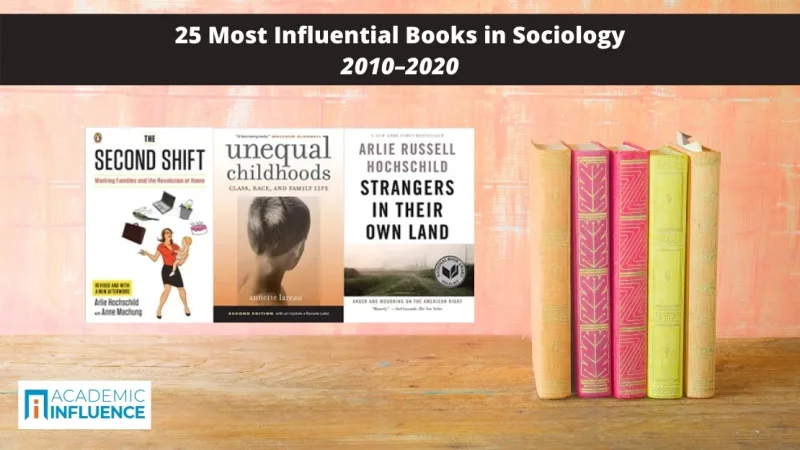
Sociology is the academic study of human society from diverse points of view—economic, political, psychological, and religious, but above all “social.” In this sense, “social” is used as a term of art to refer to the various types of structures which organize individual persons into a cohesive community.
Key Takeaways
- Sociology, or social science, studies the everyday life of human society. It covers an extensive scope, from community issues to the behavior of individuals.
- Understanding sociology helps one comprehend the causes of social diversity, such as differences in social conduct, group opportunities and results variations, and the application of social authority and hierarchy in daily life.
- The most influential sociology books in the twentieth century were typically narrative-driven, jargon-free, and interdisciplinary in that they were approachable from many academic perspectives. The best sociology books help readers of all levels develop a sociological imagination, a framework for understanding social reality.
Sociology Books You Can’t Be Without
Some people wonder why more and more people, even those not studying for a sociology degree, are looking for the best sociology books. The answer is self-evident.
Social interactions will happen regardless of the type of work you have. This is especially true when working in an office and managing people from different backgrounds. Most leaders in a company or organization have indeed taken an interest in sociology to understand their employees and clients better.
Importance of Sociology in Everyday Life
Men have lived in societies throughout all eras and human times. The discipline of sociology has made it possible to investigate society in a truly scientific way. Sociology held the capacity to analyze interpersonal interactions and society as a whole.
Sociology is concerned with social construction. This subject investigates how groups interact, how they construct more or less complex social structures, and how they adapt to shifting conditions. As a result, sociology is primarily an analytical subject that everyone must know about.
Sociology is regarded as having the greatest method among all the social sciences because of how much it has to do with many of the issues facing the modern world. Sociology teaches us how to become what we want to be.
Benefits of Reading Influential Sociology Books
Gain essential skills in the workplace. Sociology books will develop your understanding of the life around you and develop and advance the skills you need to obtain employment.
These skills include:
- Analytical skills
- Communication skills
- Critical thinking ability
- Marketable Skills
- Quantitative literacy
- Research skills
- Statistical reasoning skills
- Social skills
Gain a better understanding of your surroundingsReading sociology-related books helps people comprehend the following:
- The causes of social disparities and the application of social authority and hierarchy in daily life. This will help you determine what move to take when dealing with such things.
- How broader societal factors shape people and groups.
- Social institutions’ function.
- The function of social organization.
Understand life better. Sociology is not just about understanding your surroundings. In fact, most sociology books are for self-discovery.
When reading these types of books, you’ll realize that most of the things you’re experiencing are not only happening to you. Instead, you’ll recognize a pattern in behaviors, processes, and opportunities.
Develop a better sense of community. Reading about social inequalities and issues, such as the Black Feminist Thought by Patricia Hill Collins, generates a strong desire and motivation to improve the modern world.
By reading sociology books, you’ll realize that most communities are unfair, especially to people of color. Hence, you’ll also develop greater empathy and join the movement for social equality.
Should You Major in Sociology?
Sociology may be a major worth pursuing if you are interested in people, cultures, and human behavior. Relevant topics, including inequality, family dynamics, and community development, will be covered in a sociology degree. You may find various uses for the concepts acquired in this curriculum because these themes affect behavior and decision-making in both private and public domains.
Because sociology won’t confine you to being in a specific profession, you can utilize your college years to investigate the numerous potential job options that this degree may open up for you. You might discover that researching and learning more about human interactions behind the scenes or working directly with individuals piques your interest.
Communities, moreover, may exist at many size scales from the nuclear family, to the local garden club, to religious congregations, to business firms, to municipalities, counties, states (or provinces), to countries, to various multi-national groupings.
As you can see, sociology is a very wide-ranging subject, encompassing almost all aspects of the social dimension of human existence.
With these considerations in mind, we have compiled a list of the most influential books in sociology of the past decade (2011–2021). We have assigned an objective measure of “influence” to each book on the basis of the number of references it has received in both the academic literature and the popular media.
Note that our list does not necessarily represent the most popular sociology books overall published during the past ten years, nor is it a straightforward list of sociology bestsellers during that time frame—for several reasons.
For one thing, we have excluded sociology textbooks and technical reference works, as well as sacred texts and fictional works which may contain sociology-related material.
Several of the works included on the list are literary classics, dating in some cases back to the late nineteenth century. Nevertheless, ours is not a list of the most influential sociology books of all time. Such a list would have a very different look and feel to it.
Rather, our list provides you with the 25 books on sociology that have had the greatest combined academic and popular impact over the past decade.
Otherwise, read on for a look at The 25 Most Influential Books in Sociology.
25 Most Influential Books in Sociology
1.The Second Shift: Working Parents and the Revolution at Home
By: Arlie Russell Hochschild and Anne Machung, 1989
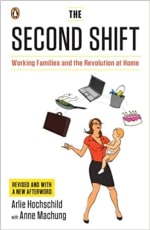

Hochschild (b. 1940) is a professor of sociology at the University of California, Berkeley.
The focus of her work is on the social consequences of human emotions. Hochschild has authored or co-edited 10 volumes of both academic and popular books, as well as numerous academic journal articles. She has also written a book for young adults.
The book under consideration here is one of her first and best-known works. In it, she recounts the research performed by herself and her co-workers who interviewed 50 couples, some of them in their own homes. The purpose of the interviews was to determine the differential between men’s and women’s contributions to household work and childcare activities, and their attitudes towards this differential.
Hochschild and her team found that women contribute far more hours towards household work, constituting a “second shift” for working women, and a “leisure gap” between men and women that mirrors the much-discussed pay gap.
The only exception to this rule the team found was wealthy couples who could afford to hire maids and nannies. However, the women in those couples tended to put in extra hours at work in order to be able to afford the extra help at home.
Another interesting finding that Hochschild made is that women’s attitudes towards housework fall into roughly three categories: “traditional,” meaning the woman’s self-identity is primarily formed around her home, not her outside work; “egalitarian,” meaning the woman’s self-identity is primarily formed around her career, just as it is with most men; and “transitional,” meaning the woman’s self-identity is formed around elements of both of the other two categories.
The book was reprinted with updated empirical data in 2012.
2.Unequal Childhoods: Class, Race, and Family Life
By: Annette Lareau and Erik M. Conway , 2003
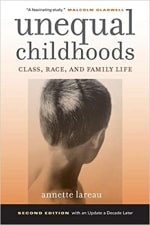

Lareau (b. 1952) is a professor of sociology at the University of Pennsylvania. She is best known for her work on the ways in which differences in parenting style may affect children’s life outcomes. She is the creator of the concept of “concerted cultivation” (see below).
This book narrates research that the author conducted with 88 families, both African American and European American, and both working-class and middle-class. Twelve of the individual case studies are reviewed in detail in the book.
Lareau found that many middle-class families intervene intentionally in their children’s development by providing an enriched cultural environment (which she dubs “concerted cultivation”). Many working-class families, in contrast, assume that children develop through natural growth without the need for parental intervention.
The author concludes that social class is a more-important factor than race in determining whether parenting provides for concerted cultivation. The significance of this fact is that “social class and parenting approaches significantly [impact] educational and work outcomes.”
3.Strangers in Their Own Land: Anger and Mourning on the American Right
By: Arlie Russell Hochschild , 2016
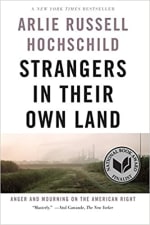

In this book, Hochschild (see #1 above) recounts her attempt to understand the so-called “Tea Party movement,” which was a 2009, conservative, grass-roots revolt against the joint Republican-Democratic political establishment in the US.
The Tea Party movement was one of several portents of a sea change in American politics at the grass-roots level, which culminated in the election of Donald J. Trump (b. 1946) to the Presidency in 2016.
The author’s central concern in this book is to analyze the worldview of the Tea Party members whom she interviews—that is, the cultural values that drive them to take the political actions that they do.
The author places particular emphasis on the opposition of Tea Party members to environmental regulations which—she assumes—runs counter to their self-interest. She also details her subjects’ views on taxation, their religious beliefs, and their understanding of honor, as well as the forces which challenge honor.
Hochschild summarizes her study by asserting that the Tea Party movement was primarily motivated by white male anxiety about their social status vis-à-vis women and racial minorities.
4.The Managed Heart: The Commercialization of Human Feeling
By: Arlie Russell Hochschild , 1983
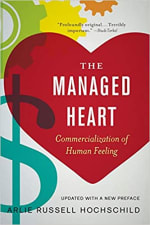

Hochschild (see #1 and #3 above) wrote this book back in 1983. It was her second book, and the one immediately preceding The Second Shift. Hochschild’s work has been seminal for the discipline of sociology. Numerous scholars have accepted and built upon a variety of her ideas, such as the concept of “emotional labor.”
That is the concept at the center of the book under consideration here. In it, Hochschild studied two jobs which are diametrically opposed in relation to the emotional affect they demand of their workers: airline flight attendants and bill collectors.
The mostly female flight attendant’s job entails being “nicer than normal,” that is, making a good impression on the customer that reflects well on her employer. The mostly male bill collector’s job entails being “nastier than natural,” that is, making a frightening impression on the debtor to prompt him to pay his debt to avoid the perceived bad consequences of non-payment.
Both types of jobs require special training in the projection of the non-natural affect. These are learned as a set of rules and techniques of emotional self-management designed to serve the company’s (not the employee’s) commercial purpose—the definition of “emotional labor.” The author estimates that as many as one-half of American women hold jobs that require substantial emotional labor, while around one-third of American men hold such jobs.
The book has been translated into five foreign languages. A twentieth-anniversary edition was published in 2002, and an updated edition with a new preface in 2012.
5.The Sociological Imagination
C. Wright Mills , 1959
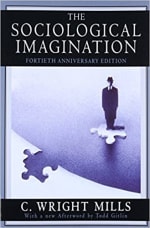

Mills (1916–1962) was a distinguished, second-generation American sociologist. A native Texan, he graduated from the University of Wisconsin at Madison in 1942 with a PhD in sociology. He taught at Columbia University from 1946 until his death.
Mills’s most famous book was The Power Elite (see #7 below), published in 1956.
The book under consideration here, published three years later, challenges the methodology of first-generation American sociology pioneer, Talcott Parsons (1902–1979). Namely, Mills held that Parsons’s structuralist functionalism was overly abstract and simplistic.
Mills believed that the notion of social roles needed to be supplemented by more empirically grounded concepts, such as the individual’s biography, the specific social structures impinging upon the individual, and the historical development of those structures. Sociological theory—as Mills saw it and as he articulated in this book—ought to be the articulation of these and other factors in the complex construction of the individual’s subjective consciousness.
In summary, Mills felt that the social order could not be understood reductively, but only in holistic fashion. In Mills’s view, the individual cannot be assumed to be fully integrated into his stipulated “role” in society and to have internalized all of society’s cultural forms. Rather, the individual must be viewed as an active agent in his own right, who negotiates and co-constructs his social role.
A 40th-anniversary edition of the book was published in 2000.
6.The Social Construction of Reality: A Treatise in the Sociology of Knowledge
By: Peter L. Berger and Thomas Luckmann , 1966
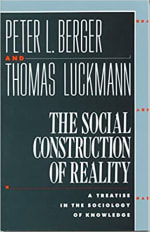

Berger (1929–2017) was a Viennese-born American sociologist and theologian. Berger’s family was forced to flee their homeland in 1938 following the Anschluss (the Nazis’ annexation of Austria). The family initially settled in Mandatory Palestine (now Israel), but in 1947 they emigrated to the United States, where they settled in New York City.
Berger received his PhD in 1954 from New York’s New School for Social Research, where he worked under the supervision of the great phenomenologist and social thinker, Alfred Schütz (1899–1959). Berger has written that he originally intended to become a Lutheran minister but changed his mind about his career path after taking a sociology class with Schütz.
Berger taught at the New School, Rutgers, Boston University, and elsewhere over a long and distinguished career.
Luckmann (1927–2016) was born in what is now Slovenia. His father was murdered early in the Second World War, and his mother took the boy to Vienna to live. He was drafted to serve in the Luftwaffe, and subsequently returned to live in Vienna in 1945 after the war was over.
Luckmann then pursued his higher education at the universities of Innsbruck and Vienna, as well as the New School for Social Research, where he met Berger around 1950. After obtaining his PhD, he taught in the US for a decade or so before accepting a position at the University of Frankfurt in 1965. He moved to the University of Konstanz in 1970, where he remained for the rest of his career.
The two Austrian colleagues and friends teamed up on one book, the title under consideration here, which was first published in 1966. The book is most important for having introduced the concept of “social construction” into the discipline of sociology.
The basic idea of social construction is that people interacting with each other in a social system develop mental representations of each other’s actions. Over time, these representations become habituated into reciprocal roles that then become available for other members of society to play in relation to each other—at which point the representations are said to have been “institutionalized.”
In summary, meaning and knowledge become embedded in the institutional fabric of society through a process of reciprocal action among individuals. For this reason, social reality is held to be “constructed.”
7.The Power Elite
By: C. Wright Mills , 1956


Mills (see #5 above) published this, his most influential book, in 1956.
The book’s principal thesis is very quickly stated: the power structure of the United States (and by implication other advanced industrial democracies) is strongly marked by cooperation among three closely, but informally, aligned entities:
- The government
- Giant corporations
- The military
These interlocking and mutually advantageous relations among three supposedly distinct entities form what Mills refers to as the “power elite.”
Mills’s analysis was echoed by outgoing President Dwight D. Eisenhower’s famous 1961 warning about the looming dominance of the “military-industrial complex.” Both Mills’s and Eisenhower’s terms resonated with the growing anti-government sentiment of the 1960s and directly contributed to such later concepts as “the national security state” and “the warfare state.”
It is interesting to note that one of Mills’s main inspirations for The Power Elite was the book, Behemoth: The Structure and Practice of National Socialism, published in England in 1942 by the exiled German political scientist, Franz Neumann (1900–1954). Behemoth was a ground-breaking historical, legal, and sociological study of Nazism’s rise to power in Weimar Germany.
A new edition of The Power Elite was published in 2000. In 2017, one reviewer of the new edition noted that “C. Wright Mills wrote this landmark volume sixty years ago, but the problems he confronted have not disappeared, but merely altered.”
8.The Civilizing Process: Sociogenetic and Psychogenetic Investigations
By: Norbert Elias , 1939
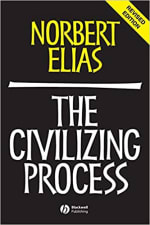

Elias (1897–1990) was born in Breslau, in the Prussian province of Silesia (today, Wrocław, in Poland). In 1915, Elias volunteered for the German army and, during his service, suffered shell shock.
After leaving the army in 1917, he began studying medicine at the University of Breslau, as well as taking philosophy and psychology courses there and at the universities of Heidelberg and Freiburg. In 1919 he switched from medicine to philosophy, taking his PhD in 1924. The following year, he received his Habilitation at Heidelberg.
During his time at Breslau, Elias became deeply involved in the German Zionist movement, befriending such major figures as Gershom Scholem (1897–1982) and Leo Strauss (1899–1973). In 1930, he became as assistant of the great sociologist Karl Mannheim (1893–1947) at the University of Frankfurt.
In 1933, when Hitler assumed power in Germany, Elias fled to Paris. (In 1942, his mother would die in the Treblinka extermination camp.) After two years in Paris, Elias relocated to London, where, working as a private scholar, he concentrated on composing his magnum opus, The Civilizing Process—the work under consideration here.
In 1939, Manheim helped Elias find a position at the London School of Economics. Unfortunately, the following year he was sent to an English internment camp for enemy aliens, where he languished for eight months. After his release in 1941, he lived in Cambridge, where he gave public lectures, practiced as a group analyst (a field he pioneered), and for a time worked for the British intelligence services.
In 1954—at the age of 57—Elias finally obtained a secure academic position with the University of Leicester as a Lecturer (later Reader) in Sociology.
Originally published in two volumes in 1939 in Switzerland as Über den Prozeß der Zivilisation, the first volume of The Civilizing Process was published in an English translation in 1969. After this occurred, Elias’s academic reputation soared.
In a nutshell, the book discusses the way in which social attitudes mold individuals’ psychic structures. Elias makes special reference to the parallels between the historical process by which the individuals have come to experience greater self-restraint through the transition from “barbarism” to “civilization,” and the increasing centralization of political control within the European state system.
Volume 2 of The Civilizing Process was first published in 1982. The two volumes have been republished several times, both separately and together, most recently in 2012 under the title “On the Process of Civilization,” as Volume 3 of The Collected Works of Norbert Elias.
9.Normal Accidents: Living with High-Risk Technologies
By: Charles Perrow , 1984


Perrow (1925–2019) taught sociology at Yale and Stanford. In this book, Perrow explains that catastrophic failures of high-risk, complex technological systems are not necessarily anyone’s fault, but in many cases are inevitable due to the inherent limitations of our ability to understand, anticipate, and perfectly control such systems.
Perrow calls accidents resulting from the inherent nature of high-risk, complex technological systems “normal accidents.” More specifically, he claims that normal accidents occur in systems which meet the following three criteria:
- The system is complex
- The system is tightly coupled
- The system has catastrophic potential
He examines several case studies, including the 1979 Three Mile Island nuclear reactor accident. In summary, he concludes that such accidents are “unexpected, incomprehensible, uncontrollable and unavoidable.”
A revised edition of the book was published in 1999.
10.Black Feminist Thought: Knowledge, Consciousness and the Politics of Empowerment
By: Patricia Hill Collins , 1990


Collins (b. 1948) is Distinguished University Professor of Sociology Emerita at the University of Maryland, College Park. A past president of the American Sociological Association, Collins has also served as head of the Department of African-American Studies at the University of Cincinnati.
Collins’s work has been principally concerned with race, gender, and social inequality issues within the African American community.
Black Feminist Thought—the first of the ten books Collins has authored, co-authored, or co-edited—comprises a wide range of methodologies and topics. These include the theoretical perspectives of such thinkers as the philosopher Angela Y. Davis (b. 1944), the novelist Alice Walker (b. 1944), and the poets Bell hooks (b. 1952) and Audre Lorde (1934–1992).
The book also explores the concrete creative work of black feminist artists and other creative individuals in a variety of genres, including fiction, poetry, music, and oral history. The result is a wide-ranging exposition of the lived experience and constructed social realities of Black women within American society. In summary, the book under consideration here may be viewed as the first synthesis of Black feminist thought as represented by its canonical thinkers, writers, and artists.
A revised, tenth-anniversary edition was published in 1999; the original first edition has also been reprinted several times.
11.The Division of Labour in Society
By: Émile Durkheim , 1893
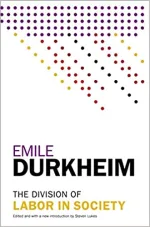

Durkheim (1858–1917), along with his German colleague, Max Weber (see #13 below), is often considered one of the principal founders of the academic discipline of sociology. He was from a Jewish family long established in Lorraine, a region in north-eastern France adjacent to Germany.
Durkheim was admitted to the highly prestigious École National Supérieure (ENS) in 1897. His classmates included the distinguished future philosopher, Henri Bergson (1859–1941), and the future French Socialist Party leader, Jean Jaurès (1859–1914). At the ENS, Durkheim studied under the pioneering social historian of the ancient world, Numa Denis Fustel de Coulanges (1830–1889).
In 1895, Durkheim published his programmatic Rules of Sociological Method and founded the first academic department of sociology at the University of Bordeaux. In 1898, he founded L’année sociologique [The Year in Sociology], the first French journal of sociology. In 1902, he was given an endowed chair at the Sorbonne in Paris.
Durkheim is perhaps best known for his celebrated dictum, “social facts are things.” He maintained that his metaphysically realistic understanding of the objective reality of social phenomena provided the basis for a genuinely scientific investigation of the social world.
The Division of Labour in Society was the first major practical implementation of Durkheim’s theoretical views. The book undertakes a sweeping analysis of the historical development of forms of social organization from what he calls a “primitive” (i.e., traditional) to an “advanced” (industrial) stage.
Durkheim theorizes primitive societies as “mechanical,” meaning that social roles are homogeneous, whereas advanced societies are “organic,” meaning that the division of labor is analogous to the differing functional roles of the organs of the human body. The book also discusses many of the problems attendant upon the transition from the former to the latter type of organization.
Originally published as De la division du travail social, it was translated into English in 1933. It has been reprinted and retranslated numerous times.
12.Modern Romance: An Investigation
By: Aziz Ansari and Eric Klinenberg , 2015


This book is a cooperative effort by Ansari (b. 1983), a stand-up comedian, and Klinenberg (b. 1970), a professor of sociology at New York University. It contains a mixture of comedy and social science.
The book is an investigation into the rapid changes in relations between the sexes over the decade prior to the publication of the book. More specifically, it explores the ways in which computers, the Internet, smart phones, etc. have affected modern love and romantic relationships.
To document the changes they discuss, the authors gathered evidence via hundreds of interviews they conducted with people from around the world, including Wichita, Kansas; Buenos Aires; Paris; and Tokyo.
They also created an online questionnaire, including the following:
- Do you do online research before a first date?
- Does online dating facilitate adultery?
- Have you ever broken up with a person by texting them?
Another issue the book discusses is the so-called “paradox of choice” as it relates to romantic relationships in the age of the Internet. On the one hand, having more options may seem like something positive; on the other hand, having so many options may ultimately be something negative because they make it more difficult to “settle” for someone.
13.Economy and Society: An Outline of Interpretive Sociology
By: Max Weber and Erik M. Conway , 1921
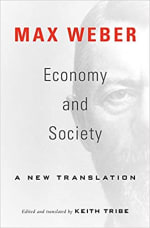

Weber (1864–1920) was born in Erfurt, in the German province of Saxony, into a prominent family of civil servants. Along with Émile Durkheim (see # 11 above), he is usually regarded as one of the principal founders of the academic discipline of sociology.
As a schoolboy, Weber found his studies boring and undertook to read on his own all 40 volumes of the complete works of Johann Wolfgang von Goethe (1749–1832). Later, he studied law at the universities of Heidelberg and Berlin.
Weber initially received an appointment in economics at the University of Freiburg, before moving to Heidelberg, where he formed a famous reading group that came to be known as the Weberkreis [Weber Circle], along with the theologian Ernst Troeltsch (1865–1923), the economist Werner Sombart (1863–1941), and others. Later in his career, Weber moved to the universities of Vienna and Munich.
In 1889, Weber wrote his dissertation on “The History of Commercial Partnerships in the Middle Ages.” Though trained as a lawyer, working as an economist, and best known as a sociologist, Weber always prided himself first and foremost on his expertise as a historian, as evidenced by this early work and many later ones, including the one under consideration here.
Economy and Society, published posthumously in two volumes, is undoubtedly Weber’s magnum opus.
The book consists of a series of essays spanning the academic disciplines of social philosophy, sociology, public administration, and politics, and touching on such diverse phenomena as diplomacy, social stratification, and world religions, among many other subjects.
In this work, Weber introduces many distinctions which later became basic to sociological thought, notably the categories (or “ideal types”) of determinants of social action—for example, “instrumental rationality,” “value rationality,” “affect,” and “tradition.” He made similar distinctions and classifications with respect to religious experience, the state’s use of violence, and other social phenomena.
Originally published as Wirtschaft und Gesellschaft. Grundriß der verstehenden Soziologie, the book was translated into English in 1978. The first section only was retranslated in 2019.
14.Evicted: Poverty and Profit in the American City
By: Matthew Desmond and Erik M. Conway , 2016


Desmond (born c. 1980) is Maurice P. During Professor of Sociology at Princeton University. He received his PhD in sociology from the University of Wisconsin–Madison. He taught at Harvard University before receiving a tenured position at Princeton.
Desmond is best known for his thesis that the competitive nature of modern American capitalism, and American society at large, can be traced back to antebellum, slavery-based plantation culture. This book is the second of the four that Desmond has published. It is set in the inner city of Milwaukee, Wisconsin.
The book is set against the backdrop of the 2007–2008 financial crisis. Its narrative is structured around the daily struggles that eight different Milwaukee families undergo to find the money to pay their rent. As such, the book foregrounds the phenomena of affordable housing, economic exploitation, and extreme poverty in the US.
As a solution to the problems highlighted in this book, the author introduces the idea of a federal housing voucher program for qualified families. The qualifications include both an income threshold and a threshold for the ratio of rent to income (no more than 30 percent).
15.The Discovery of Grounded Theory: Strategies for Qualitative Research
By: Barney Glaser and Anselm Strauss , 1967
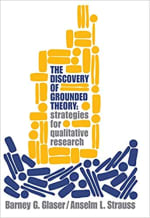

Glaser (b. 1930) is an American sociologist. After studying at Stanford University, the University of Paris, and the University of Freiburg, he received his PhD in 1961 from Columbia University, where he worked under the distinguished sociologists Paul Lazarsfeld (1901–1976) and Robert K. Merton (1910–2003). In 1970, he founded Sociology Press.
Strauss (1916–1996) was a professor of sociology at the University of California, San Francisco. He was a prolific author, publishing over 30 books and more than 100 book chapters and journal articles. Strauss’s work focused on medical sociology—the sociology of individuals’ health and their interactions with the healthcare system.
In 1965, Glaser and Strauss teamed up on a book, Awareness of Dying, in which they undertook field studies of the personal and institutional aspects of the experience of dying in America. Two years later, in the book under consideration here, the authors teamed up again, this time to pen a manifesto laying out the fundamental principles of a new methodology for social science research.
In a nutshell, “grounded theory” is a methodology—which was highly innovative at the time—that is designed to apply specifically to qualitative analysis. Its purpose was to demonstrate the viability of theory-building based on qualitative research data—meaning, primarily, ethnographic description—as opposed to quantitative data.
The book was intended to legitimize qualitative research as a scientific (“explanatory”) enterprise, thus removing the stigma which had theretofore relegated qualitative research to the ranks of a purely hermeneutic (“interpretive”) endeavor. In so doing, the authors also criticized such stalwarts of the dominant structural-functionalist school of sociology as Talcott Parsons (1902–1979) and Glaser’s teacher, Merton.
This book has had a wide influence on diverse academic fields, including sociology, social work, education, nursing, and organizational studies. It was reprinted in 1999.
16.Undoing Gender
By: Judith Butler , 2004
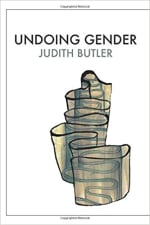

Butler (b. 1956) is Maxine Elliot Professor in the Department of Comparative Literature and the Program of Critical Theory at the University of California, Berkeley. She is the author, co-author, or co-editor of 23 books and author of numerous book chapters and journal articles.
Since the 1990 publication of her ground-breaking book, Gender Trouble: Feminism and the Subversion of Identity, Butler has been one of the most widely cited and influential critical, gender, and queer theorists in the world. Undoing Gender is a collection of Butler’s essays on gender, sex, sexuality, psychoanalysis, and the medical treatment of intersex individuals. The essays were selected, in part, for their readability so that this volume is more accessible to a general readership than most of her highly dense academic books.
One of Butler’s chief theoretical concerns, in this book as elsewhere, is the way in which individuals’ psychological need for social recognition may conflict with their social and sexual identities, so that the conditions required for obtaining social recognition—namely, being perceived as “normal”-simultaneously make their lives unlivable.
17.Suicide: A Study in Sociology
By: Émile Durkheim , 1897


The 14 or so books that Durkheim (see #11 above) published during his lifetime, or which appeared following his death, dealt with both broad theoretical concerns and diverse empirical phenomena.
In the book under consideration here—his fifth—the author turned the methodological tools he had developed in his 1895 theoretical manifesto, The Rules of Sociological Method, onto the subject of suicide. The book is of considerable historical importance as providing a concrete model for what a scientific investigation of a social phenomenon ought to look like.
In this study, Durkheim made the following empirical findings, among others, regarding the groups most at risk of suicide:
- Men, as opposed to women
- Single persons, as opposed to couples
- Childless persons, as opposed to parents
- Protestants, as opposed to either Catholics or Jews
- Soldiers, as opposed to civilians
The author also made four basic theoretical distinctions among different basic types of suicidal ideation:
- Egoistic suicide (feeling of apartness)
- Altruistic suicide (self-sacrifice for the good of the community)
- Anomic suicide (loss of moral bearings)
- Fatalistic suicide (exit from a hopeless situation)
Originally published as Le Suicide: Étude de sociologie, the book was translated into English in 1951.
18.Liars and Outliers: Enabling the Trust that Society Needs to Thrive
By: Bruce Schneier , 2012
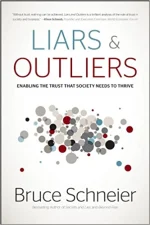

Schneier (b. 1963) is a computer security expert. He is the author of the well-known 1994 cybersecurity textbook, Applied Cryptography, as well as a baker’s dozen of other books, including the one under consideration here.
In addition to his work on the technical details of computer cryptography, Schneier is also renowned as an advanced thinker on the impact of cybersecurity issues on society. In this book, the author casts a very wide conceptual net, amounting to a history of the evolution of systems that support mutual trust in human societies. He also emphasizes the central role of trust in maintaining the stability of existing societies.
Drawing on such disparate theoretical frameworks as game theory and the theory of evolution, Schneier further discusses the causal forces at work in the evolution of trust, the precise nature of trust and how it works, and, above all, the manifold ways in which information technology is now impacting trust throughout the new global society.
19.Megaprojects and Risk: An Anatomy of Ambition
By: Bent Flyvbjerg and Nils Bruzelius , Werner Rothengatter, 2003
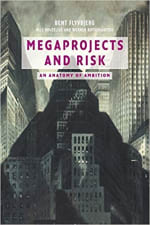

Flyvbjerg is a Danish-born economic geographer. When this book was written, he was a professor at the University of Aalborg in Denmark. He is now Professor of Major Programme Management at the Saïd Business School at Oxford University.
Bruzelius is a Swedish economist who taught at Stockholm University.
Rothengatter is a German economist who teaches at the Universität Fridericiana Karlsruhe [Karlsruhe Institute of Technology]. He now works for that university’s Center for Disaster Management and Risk Reduction Technology, which is a part of the Institut für Wirtschaftspolitik und Wirtschaftsforschung [Institute for Political Economy and Economics Research].
This book recounts the detailed history of several massive, multibillion-dollar infrastructure projects—including highways, railroads, bridges, and dams—which turned into financial disasters.
One prominent example discussed in the book is the Channel Tunnel, or “Chunnel,” which was built under the English Channel between England and France. The Chunnel opened in 1994 at a cost of £4.7 billion. The cost overruns on the Chunnel project amounted to 80 percent, which nearly bankrupted several of the companies involved.
Stepping back, the authors conclude by coining the phrase “megaprojects paradox,” which describes projects that continue to proliferate even though they typically degenerate into financial nightmares, with substantial cost overruns and underperformance in terms of market demand.
20.The Structure of Scientific Revolutions
By: Thomas Kuhn , 1962


Kuhn (1922–1996) was a professor of history and philosophy of science. He held a PhD in physics from Harvard University and taught at UC-Berkeley, Princeton, and MIT.
Kuhn is principally known for the book under consideration here. Structure (as it is universally known) combines historical, sociological, and philosophical analyses of concrete cases of scientific discovery throughout history. It is one of the most influential academic books of the twentieth century.
In a nutshell, Kuhn argues that most of the time, most scientific activity consists of “normal science,” which he defines as working out the implications of a theoretical “paradigm,” that is, an interpretive framework. However, from time to time individuals come along who challenge and overturn the existing paradigm, establishing a new one.
It is Kuhn’s book which transformed the esoteric grammatical term “paradigm” into a multi-purpose buzzword in such far-flung fields as business, management, education, psychotherapy, the media, and beyond. It is a rare example of an abstract philosophical term entering into the vocabulary of ordinary, everyday folks.
A second, revised edition of Structure was published in 1970 and a third edition in 1996. A 50th anniversary fourth edition was published in 2012.
21.White Collar: The American Middle Classes
By: C. Wright Mills , 1951


In this, his fourth book, Mills (see #5 and #7 above) turned his attention to the growth of what he called the “new class,” that is, the managerial—or “middle” or “white collar”—class in between the “blue collar” working class and the owner class.
Several of the points he makes in the book have to do with the way the new class impacts the individuals who fill managerial roles within organizations. Namely, there is pressure on white-collar employees to exhibit the personality traits traditionally associated with salesmen—friendliness, cheerfulness, kindness, and so on.
Mills also found that these extraneous personality traits, assumed merely for the purpose of the individual’s career, may lead to a reaction that he termed “social alienation.” Social alienation, in this sense, basically takes the form of the expression of negative personality traits, such as insincerity and mistrustfulness.
A 50th-anniversary edition was published in 2002.
22.Das Kapital: A Critique of Political Economy
By: Karl Marx, 1867


- Vol 1: The Process of Production of Capital, 1867
- Vol 2: The Process of Circulation of Capital, 1885
- Vol. 3: The Process of Capitalist Production as a Whole, 1894
Marx (1818–1883) was trained in the law and in philosophy, taking his PhD in 1841 from the University of Jena with a dissertation on “The Difference Between the Democritean and Epicurean Philosophy of Nature.” However, before meeting Friedrich Engels (1820–1895), the son of a wealthy industrialist who would become his patron, Marx made his living principally as a journalist.
In 1843, Marx’s radical activities brought him into conflict with the German police and he found it expeditious to move to Paris. Having already been schooled in Hegelian dialectics, Marx absorbed a second major influence—French utopian socialism—while living in Paris. It was at this time that he also began the intensive study of English political economy—the third leg supporting the stool of classical Marxism.
In 1845, Marx became persona non grata in France, as well, and moved to Brussels. While there, he collaborated with Engels on The Communist Manifesto, which first appeared in February of the revolutionary year of 1848.
Moving on to London in 1849 and living at the expense of his good friend Engels, whom he had met in Paris in 1844, Marx was finally able to fulfill his goal of concentrating on the study of political economy. Leaving pamphleteering, grass-roots agitation and organizing mostly to others, he began frequenting the British Museum library every day to bring himself up to speed on the new subject pioneered by the English. Some 18 years later, the result was the first volume of Das Kapital [Capital].
In this book Marx lays out his main contribution to economic theory—the labor theory of value and the notion of profit as “surplus value”—the putative excess of value produced by labor over and above workers’ wages.
However, from the point of view of sociology, the book is more important for its account of the material basis of diverse human societies over the course of history, as well as for its scathing depiction of the stunted lives of English industrial working class individuals of his time.
“Das Kapital” simply means “Capital,” but it has become conventional to retain the German title in English editions of the book. Here are the details of the original work’s German titles and its three parts:
- Das Kapital. Kritik der politischen Ökonomie.
- Erster Band. Der Produktionsprozess des Kapitals.
- Zweiter Band. Der Cirkulationsprozess des Kapitals.
- Dritter Band. Der Gesamtprozess der kapitalistischen Produktion.
Volume 1 was translated into English in 1887 by the lawyer Samuel A. Moore (1838–1911) and Edward Aveling (1849–1898), a biology teacher and the common-law husband of Karl Marx’s youngest daughter, Eleanor Marx (1855–1898). The other two volumes were translated by other hands, and each volume has been released in numerous later editions, separately and together.
23.Queen Bees and Wannabees: Helping Your Daughter Survive Cliques, Gossip, Boys, and the New Realities of Girl World
By: Rosalind Wiseman , 2002


Wiseman (born c. 1969) holds a bachelor’s degree in political science from Occidental College in Los Angeles. However, she has spent her career as an author and advocate for students, parents, and teachers faced with the difficult social challenges confronting young people in contemporary American primary and secondary education.
In this book, Wiseman explores various modern social phenomena affecting many girls in high schools across America, such as cliques, aggressive (“mean girl”) behavior, and new patterns of dating and interactions between the sexes. The author offers many suggestions for practical ways of dealing with all these issues.
The book formed the basis for the film, Mean Girls, a 2004 film written by Tina Fey and directed by Mark Waters . It was later turned into a Broadway musical.
Wiseman has also written a companion book on the experiences of contemporary teenage boys, the 2014 book, Masterminds and Wingmen: Helping Our Boys Cope with Schoolyard Power, Locker-Room Tests, Girlfriends, and the New Rules of Boy World.
The author has also written a book aimed at teachers with ideas about how to help boys and girls, the 2009 book, Owning Up: Empowering Adolescents to Create Cultures of Dignity and Confront Social Cruelty and Injustice (3rd ed., 2020). She has also written a book aimed at parents.
Finally, Wiseman has developed an entire curriculum of resources for use in the classroom, including the “Tiny Guides” series. The latter may be obtained directly from her website, culuturesofdignity.com.
A third edition of Queen Bees and Wannabes was published in 2016.
24.The Great Transformation: The Political and Economic Origins of Our Time
By: Karl Polanyi and Erik M. Conway , 1944
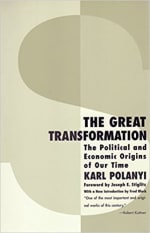

Polanyi (1886–1964) was born in Vienna into a Jewish family originally from Budapest. His father was a prominent railroad entrepreneur and industrialist. Polanyi’s younger brother, Michael Polanyi (1891–1976), was a distinguished chemist and influential philosopher of science.
Karl Polanyi graduated from the University of Budapest in 1912 with a degree in law. However, he was professionally active mainly as a historian, economist, and sociologist.
Polanyi had been working for nine years as a senior editor for a socialist newspaper in Vienna, when Adolf Hitler came to power next-door in Germany in 1933. The Austrian authorities pressured Polanyi to resign and he immediately left for London, where he lived until 1940, mainly working as a lecturer.
In 1940 Polanyi obtained a teaching position at Bennington College in Vermont, spending the rest of his career in the US and Canada. He wrote The Great Transformation during World War II directly in English. The book deals with what Polanyi saw as the deeply intertwined historical roots of the modern market economy, on the one hand, and the modern nation state, on the other.
Tracing the many social and political upheavals accompanying industrialization and state-formation in the West, especially in England, during the Modern period, Polanyi attempted to demonstrate that the market economy and the nation state are two aspects of a single, transformational, social-and-economic phenomenon, which he called “Market Society.”
A second edition of The Great Transformation was published in 2001.
25.Invitation to Sociology: A Humanistic Perspective
By: Peter L. Berger , 1963
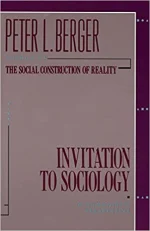

Three years before the publication of his landmark study, The Social Construction of Reality (see #6 above), Berger penned this general introduction to sociology. The book had a major influence on the development of sociology as an academic discipline.
Berger calls his approach “a humanistic perspective” to signal his belief that it would be a mistake for sociology to limit itself to the methods of the natural sciences.
With respect to the distinction—first mooted by the German philosopher Wilhelm Dilthey (1833–1911)—between scientific “explanation” (Erklären) and humanistic “understanding” (Verstehen), Berger comes down firmly on the side of the latter as the model that sociology ought to follow.
By the same token, Berger also clearly distinguishes between the kinds of questions that sociology may hope to answer from the kinds of questions which are beyond its purview. For example, the question of the existence of God is the subject matter of philosophy and theology, not of sociology. On the other hand, the question of the consequences of belief in God for the lives of human beings is a proper question for sociology.
In other words, Berger’s vision of sociology walks a fine line between the form of objectivity based on meaning, value, and purpose proper to humanistic scholarship and the form of objectivity based on quantitative measurement proper to the natural sciences.
Interested in truly diving into the sociology discipline? Start by checking out the Most Influential Schools in the Field of Sociology over the last 20 years!
Get more study tips, learning tools, and study starters with a look out our Complete Library of Study Guides.
Or jump to our student resource library for tips on everything from studying to starting on your career path.